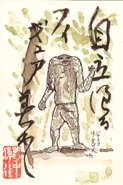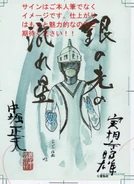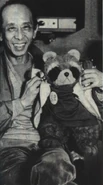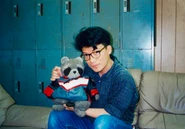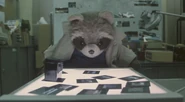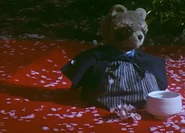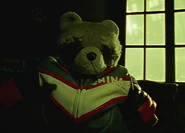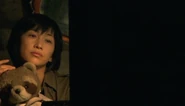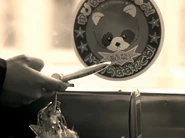Akio Jissoji was a Japanese director, screenwriter and novelist, known for his his unique visual style and filming techniques, as well as his unorthodox themes and fantastical depictions of reality. He directed Ultraman Series episodes in the Showa and Heisei eras. He was also known for his collaborations with the Art Theatre Guild.
Jissoji used stage names Yuri Manpukuji for his unused Ultra Q scripts and Takashi Kawasaki for his Ultraseven scripts.
Career
Akio Jissoji was born in Tokyo in 1937, but during the Second World War, he and his family lived in China. Afterwards, they returned to Japan and settled in Kawasaki. Inspired by French cinema, he attended Waseda University, where he majored in French literature. After graduating in 1959, he began working for Tokyo Broadcasting System, directing dramas and musicals with cues taken from French cinema.
He first began to work with Eiji Tsuburaya in 1965 when TBS executives reassigned him to Tsuburaya Productions due to their distaste for his strange directorial style. During this time, he submitted two scripts for Ultra Q, neither of which were accepted, and directed a documentary on Eiji Tsuburaya called "The Father of Ultra Q" and The Birth of Ultraman stage show. He soon began working on episodes of Ultraman and Ultraseven, becoming notable for the maverick style of his direction for the series.[1]
After Ultraseven ended, Jissoji began to dabble with experimental short films (often pornographic in nature) as well as submit storylines for other Ultraman shows (only one of which was accepted). Then, after a brief retirement, he returned to directing movies in 1988, with varying degrees of success. In 1996, he returned to television when Tsuburaya resurrected the Ultraman franchise with Ultraman Tiga. Afterwards, his work on Ultraman became more sporadic as he focused more on theatrical projects, continuing to work until he died in 2006 from stomach cancer.
Directorial Style
Many of his works for the Ultraman Series are noted by fans for being unorthodox in their storytelling and camerawork, often turning conventions of the franchise formula upside-down. Some of them even border on surrealist, similar to the arthouse movies he worked on in the 1970s. This made him controversial with some of his fellow directors, notably Samaji Nonagase, who voiced a strong dislike for the the infamous scene in which Shin Hayata mistakenly attempts to use a spoon instead of the Beta Capsule.
Works
- Ultra Q (1966) - Writer, 2 unmade episodes
- The Father of Ultra Q (1966) - Director and writer[4]
- The Birth of Ultraman (1966) - Director
- Ultraman (1966-1967) - Director, 6 episodes
- Episode 14 "The Pearl Defense Directive"
- Episode 15 "Terrifying Cosmic Rays"
- Episode 22 "Overthrow the Surface"
- Episode 23 "My Home Is Earth"[5]
- Episode 34 "Present from the Sky"
- Episode 35 "The Monster Graveyard"
- Ultraseven (1967-1968) - Director and writer, 5 episodes (one unmade)
- Episode 8 "The Marked Town" (director)[6][7]
- Episode 12 "From Another Planet with Love" (director)
- Episode 43 "Nightmare of Planet No. 4" (director and writer)[8]
- Unproduced episode 43 "Aliens 15 + Monsters 35" (writer and scheduled director)
- Episode 45 "The Saucers Have Come" (director and writer)[9]
- Operation: Mystery (1968-1969) - Director, 4 episodes[10]
- Episode 4 "Fearful Phone Calls"
- Episode 5 "The Grim Reaper's Lullaby"
- Episode 23 "The Cursed Jar"
- Episode 25 "I Will Buy Kyoto"
- Return of Ultraman (1971) - Writer, 2 episode (one unmade)
- Episode 28 "Ultra Special Operation"
- Unproduced episode "The Moon Fairy Tale"
- Ultraman Taro (1973-1974) - Writer, 1 unmade episode
- Unproduced episode "Monsters Unforeseeable! Kneeling Before the Rising Sun"
- Ultraman (1979) - Director[11]
- The Men Who Made Ultraman: Moon Ship in a Forest of Stars (1989) - Supervisor
- Ultra Q The Movie: Legend of the Stars (1990) - Director[12]
- Ultraman Tiga (1997) - Director and original draft writer, 3 episodes (one unmade)[13]
- Episode 37 "Flower" (director and original draft writer)
- Episode 40 "Dream" (director and original draft writer)
- Unproduced episode "The Love and Freedom Star" (scheduled director)[14]
- Cyber Beauties Telomere (1998) - Title
- Ultraman Dyna (1998) - Director, 2 episodes (one unmade)
- Episode 38 "Monster Drama"[15]
- Unproduced episode 39 "The Musician's Forest" (scheduled director)
- The Path of Dreams: The Mystery of Ultraman (2003) - Director[16][17]
- The Ultra Q Club (2003-2004) - Director
- Ultra Q: Dark Fantasy (2004) - Director, 2 episodes[18]
- Mysterious Incident Special Investigation Team SRI: The Sneering Man Engulfed in Flames (2004) - Title
- Ultraman Max (2005) - Director, 2 episodes[19]
- Episode 22 "Butterfly Dream"[20]
- Episode 24 "The Untargeted Town"
- Operation: Mystery - Second File (2007) - Series compositor, title and writer, wrote 1 episode[21]
- Episode 2 "Showa Koji Gento"
- Ultraman: Monster Bible (unproduced) - Scheduled director
- Ultra Q: Monster Concerto (unproduced) - Scheduled director
- Ultraman: Monster Mugen (unproduced) - Scheduled director
Literature
- Ultraman: Operation Gold Rush (1993) - Writer
- Ultraseven: The Targeted Star (1994) - Writer
Other Works
- Mujo (1970)
- Mandala (1971)
- Poem (1972)
- Lanterns on Blue Waters (1983)
- Tokyo: The Last Megalopolis (1987)
- Murder on D Street (1998)
- The Summer of the Ubume (2005)
- Die Silbermaske (2006)
Gallery
Art
Trivia
- Jissoji often includes a raccoon plush toy named Chinabo in his works, which he refers to as his son. Chinabo also has a younger brother named Kuruzu as well as a cousin named Minobo .[23]
References
- ↑ https://www.m-ranenkei.com/entry/2019/01/11/190000
- ↑ https://www.y-komori.net/garagekit/work/ultraq_39.html
- ↑ https://x.com/MarususanNeo/status/1146938830903058432/
- ↑ https://m-78.jp/news/n-4709
- ↑ https://m-78.jp/news/post-5372
- ↑ https://www.asahi.com/articles/ASQCV3QV9QCTUGTB00Q.html
- ↑ http://ketsulog.com/archives/50800321.html
- ↑ https://www.zakzak.co.jp/entertainment/ent-news/news/20170404/enn1704041700003-n1.htm
- ↑ https://m-78.jp/news/post-6650
- ↑ https://moak.jp/event/performing_arts/post_311.html
- ↑ https://cocreco.kodansha.co.jp/telemaga/news/feature/kaijubiyori/3VJDJ
- ↑ https://www.shochiku.co.jp/cinema/database/04298/
- ↑ https://jissoji.wixsite.com/jissoji-lab/blank-1
- ↑ Earth Is Ultraman's Planet: Ultraman Tiga, Dyna, Gaia, pg 199
- ↑ https://www.tumblr.com/jissojilab
- ↑ https://x.com/MugenShinsi/status/1762407266320633879
- ↑ https://ndlsearch.ndl.go.jp/books/R100000002-I000004296209
- ↑ http://www.konaka.com/alice6/ultraQ/darkness.html
- ↑ https://ayamekareihikagami.hateblo.jp/entry/2020/12/14/221830
- ↑ https://cocreco.kodansha.co.jp/telemaga/news/feature/kaijubiyori/gTebc
- ↑ https://m-78.jp/news/n-621
- ↑ https://natalie.mu:8443/eiga/news/223502
- ↑ https://twitter.com/JissojiLab/status/1741678957848850466
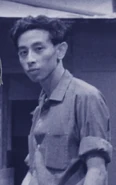
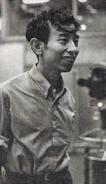
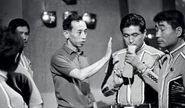
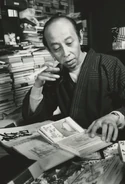
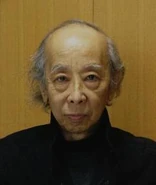
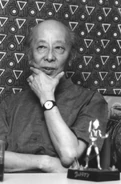
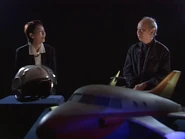
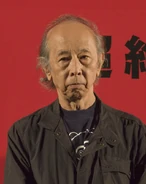
![Akio Jissoj art 1.png (1.65 MB) [22]](https://static.wikia.nocookie.net/ultra/images/a/a1/Akio_Jissoj_art_1.png/revision/latest/scale-to-width-down/131?cb=20240301201832)
